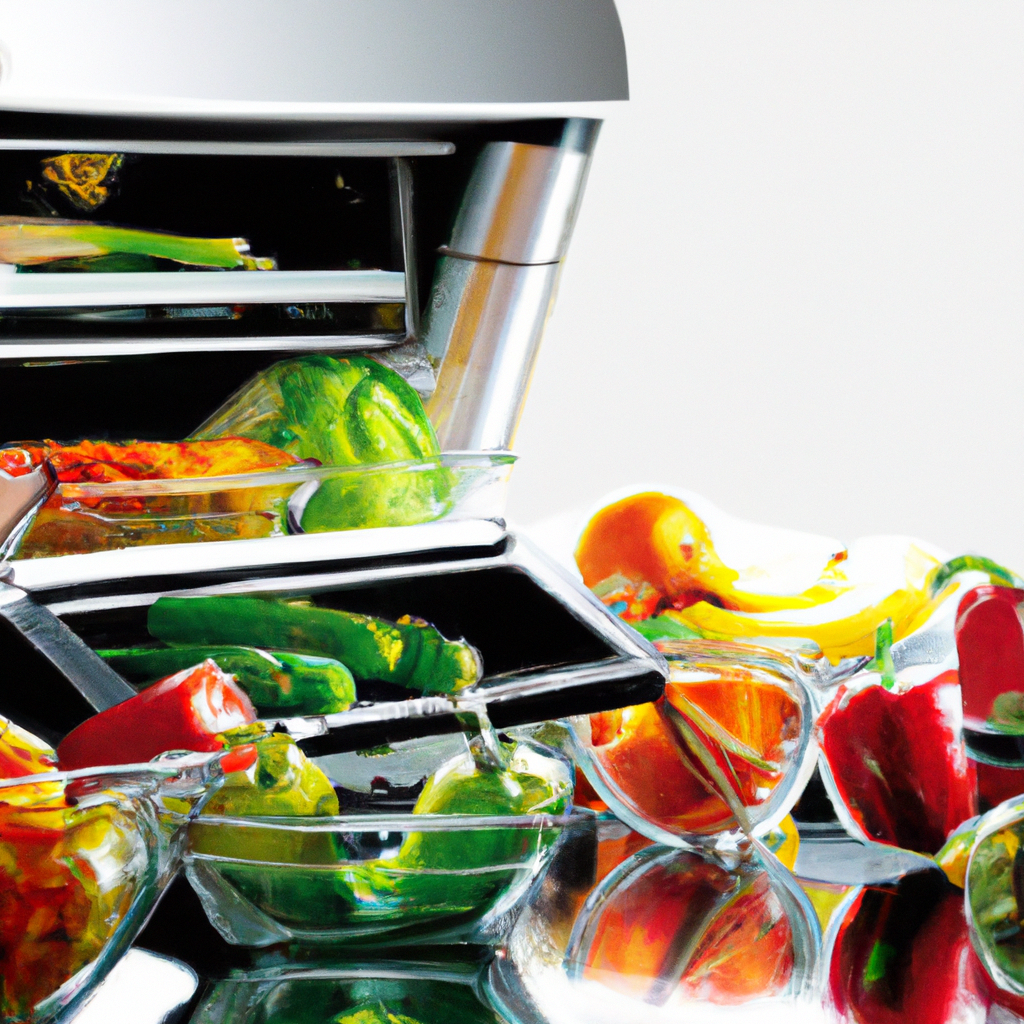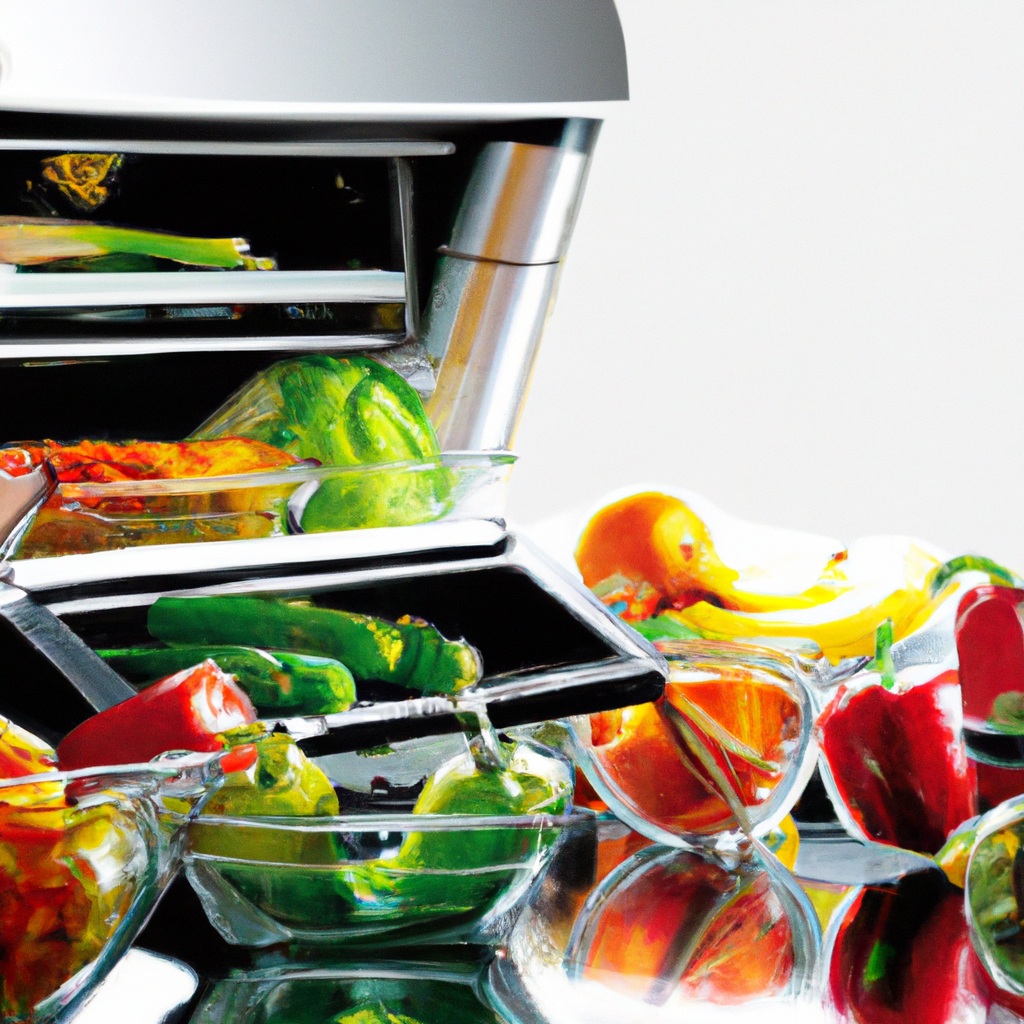Imagine a world where your kitchen gadgets could help you not only create delicious meals but also reduce food waste. It may sound too good to be true, but recent advancements in smart technology are making this a reality. Smart kitchen gadgets, equipped with sensors and artificial intelligence, are revolutionizing the way we cook and manage food in our homes. These cutting-edge devices can track your ingredients, recommend recipes based on what you have in stock, and even remind you when your food is about to expire. By harnessing the power of smart technology, we can make a significant impact on reducing food waste and creating a more sustainable future.
Benefits of Using Smart Kitchen Gadgets to Reduce Food Waste
Efficient Food Storage
One of the major benefits of using smart kitchen gadgets to reduce food waste is efficient food storage. Smart refrigerators and food dispensers are designed to optimize the storage of perishable items. These gadgets come equipped with features such as adjustable shelves, humidity-controlled compartments, and segregated storage areas, which help to prolong the freshness of different food items. By properly storing food in these smart devices, you can reduce the chances of food spoilage and waste.
Accurate Portion Control
Smart kitchen gadgets also offer accurate portion control, which is essential for preventing food waste. These devices have built-in sensors and measurement features that allow you to accurately measure the quantity of ingredients needed for a specific recipe. This helps you avoid overbuying or overcooking and ensures that you prepare just the right amount of food. By using smart kitchen gadgets for portion control, you can minimize leftovers and reduce food waste.
Real-time Inventory Tracking
Another advantage of using smart kitchen gadgets is real-time inventory tracking. Smart refrigerators and food dispensers have the ability to keep track of your food inventory and provide you with real-time updates on the quantity and expiration dates of the items stored. This allows you to have a clear view of what ingredients you have on hand and what needs to be used before it expires. With this information at your fingertips, you can plan your meals more effectively, avoid buying duplicate items, and reduce the chances of food waste.
Smart Refrigerators
Smart Temperature Control
Smart refrigerators offer advanced temperature control features, which play a crucial role in reducing food waste. These devices have sensors that monitor the internal temperature and automatically adjust it to ensure optimal storage conditions for different types of food. By maintaining the right temperature and humidity levels, smart refrigerators help to extend the shelf life of perishable items, preventing them from spoiling too soon and ending up in the trash.
Expiry Date Tracking
Another useful feature of smart refrigerators is expiry date tracking. These devices can scan barcodes or use image recognition technology to identify the items you store inside. They then automatically track the expiration dates of these items and send you alerts or notifications when something is about to expire. This feature helps you prioritize the use of perishable items before they go bad, reducing food waste and saving money.
Inventory Management
Smart refrigerators also offer inventory management functionalities. They can keep track of the items you add or remove from the fridge, updating the inventory in real-time. This feature helps you stay organized and aware of what ingredients you have available. Some smart refrigerators even integrate with grocery shopping apps, allowing you to create shopping lists directly from your fridge’s inventory. This helps to prevent overbuying and ensures that you only purchase the items you need, reducing the chances of food waste.

Smart Food Dispensers
Precise Ingredient Measurement
Smart food dispensers are designed to provide precise ingredient measurement, which is essential for reducing food waste. These devices have built-in scales or measuring mechanisms that accurately dispense the required amount of ingredients for a specific recipe. By using a smart food dispenser, you can avoid guesswork and measure ingredients with precision, preventing overpouring and minimizing leftovers.
Food Preservation Techniques
Smart food dispensers also employ various food preservation techniques to help extend the shelf life of ingredients. Some of these techniques include vacuum sealing and controlled atmospheric storage, which create optimal conditions for maintaining the freshness of different food items. By preserving ingredients effectively, smart food dispensers help to prevent food spoilage and waste.
Meal Planning Assistance
Smart food dispensers can also assist in meal planning. These devices can suggest recipes based on the ingredients you have available and help you create a meal plan for the week. By offering recipe suggestions and organizing your meal schedule, smart food dispensers ensure that you utilize your ingredients efficiently and avoid letting them go to waste.
Smart Cooking Appliances
Smart Ovens
Smart ovens offer various features that contribute to reducing food waste. They come equipped with advanced temperature control and cooking time settings, allowing you to cook food at optimal temperatures for the right duration. By ensuring precise cooking, smart ovens help to avoid overcooking or undercooking, resulting in perfectly cooked meals and fewer leftovers. Some smart ovens also offer pre-programmed recipes and cooking modes, which help you cook with ease and minimize the chances of food waste.
Smart Cookers
Smart cookers, such as slow cookers or instant pots, also play a role in reducing food waste. These appliances offer programmable cooking settings and timers, allowing you to cook meals at low temperatures for extended periods. This slow cooking method helps to tenderize tough cuts of meat and extract maximum flavors, resulting in delicious meals without any wasted leftovers. Smart cookers also come with automatic keep-warm functions, which maintain the temperature of cooked food until you’re ready to serve, minimizing the risk of food spoilage.
Smart Sous Vide Machines
Smart sous vide machines are another type of smart cooking appliance that can help reduce food waste. Sous vide cooking involves sealing ingredients in a plastic bag and cooking them in a water bath at a precise temperature for an extended period. Smart sous vide machines offer precise temperature control and cooking time settings, ensuring that you cook food to perfection every time. This cooking method allows you to maximize the utilization of ingredients, as there is minimal loss or shrinkage during the cooking process.

Smart Grocery Shopping Solutions
Digital Shopping Lists
Smart grocery shopping solutions provide digital shopping lists that can be accessed and updated from your smartphone or tablet. These apps allow you to easily create and manage your shopping lists, ensuring that you have all the necessary items and reducing the chances of impulse purchases. By using a digital shopping list, you can stay organized, avoid forgetting essential ingredients, and prevent overbuying, thereby reducing food waste.
Product Recommendations
Some smart grocery shopping solutions offer personalized product recommendations based on your preferences and dietary restrictions. These recommendations help you discover new products and make informed choices while shopping. By selecting the right products and avoiding those that don’t suit your needs, you can minimize the chances of buying items that may go to waste.
Budget Management
Smart grocery shopping solutions can also assist in budget management. These apps allow you to set a budget for your grocery shopping and track your expenses in real-time. By keeping an eye on your spending, you can make conscious decisions and avoid unnecessary purchases, reducing food waste and saving money in the process.
Smart Waste Management Systems
Food Waste Monitoring
Smart waste management systems can monitor and track your food waste. These systems use sensors or cameras to measure the amount of food waste generated and provide you with insights into your consumption patterns. By analyzing this data, you can identify the areas in which you tend to waste the most and take corrective actions. Monitoring food waste helps raise awareness about the problem and encourages you to make conscious choices to minimize it.
Composting Assistance
Smart waste management systems can also assist in composting. Some devices have composting compartments or built-in composters that enable you to convert food scraps into nutrient-rich compost for your garden. By composting your organic waste, you divert it from the landfill and reduce the environmental impact of food waste.
Smart Trash Cans
Smart trash cans are equipped with sensors that detect the level of waste and automatically compress it to create more space. These trash cans can also sort recyclable materials from non-recyclable ones. By optimizing waste disposal and encouraging proper recycling, smart trash cans contribute to reducing food waste and promoting sustainable waste management practices.

Challenges and Limitations of Smart Kitchen Gadgets in Reducing Food Waste
Cost and Accessibility
One of the main challenges of utilizing smart kitchen gadgets to reduce food waste is the cost and accessibility. Many smart kitchen gadgets come with a higher price tag compared to their traditional counterparts. This can make them less accessible to some individuals or households with limited budgets. To overcome this challenge, manufacturers need to focus on developing more affordable options and creating incentives for consumers to adopt smart kitchen technologies.
Compatibility and Integration
Another limitation of smart kitchen gadgets is compatibility and integration. Different smart gadgets may use different communication protocols or platforms, making it challenging to have seamless integration between devices. This can result in limited functionality or the need for separate apps or systems to control each gadget. Improved compatibility and integration among smart kitchen devices would ensure a more seamless user experience and maximize the potential benefits of these gadgets in reducing food waste.
Reliance on Technology
Smart kitchen gadgets heavily rely on technology, which can be a limitation in certain situations. Power outages or internet connectivity issues can temporarily render these gadgets ineffective, impacting their ability to prevent food waste. It is important to have backup plans or alternative methods for food storage and preparation to ensure that you are not solely dependent on smart kitchen gadgets in case of unexpected technological glitches.
The Future of Smart Kitchen Gadgets and Food Waste Reduction
Advancements in AI Technology
The future of smart kitchen gadgets in reducing food waste looks promising, thanks to advancements in AI (Artificial Intelligence) technology. AI-powered devices can learn from your consumption patterns, preferences, and cooking habits to provide personalized recommendations and optimize food usage. These devices can analyze data from various sources, such as smart fridges, food dispensers, and waste management systems, to offer valuable insights on food storage, cooking techniques, and shopping habits. As AI technology continues to evolve, smart kitchen gadgets will become even more efficient in reducing food waste.
Collaboration with Food Waste Organizations
Collaboration between smart kitchen gadget manufacturers and food waste organizations is crucial for effectively reducing food waste. By working together, these entities can share knowledge, expertise, and resources to develop innovative solutions and educate consumers about the importance of minimizing food waste. Collaborations can also lead to the development of smart kitchen gadgets specifically designed to address the challenges and needs of reducing food waste, ensuring that the technologies meet real-world demands.
Educating Consumers
Education plays a vital role in the successful implementation of smart kitchen gadgets for food waste reduction. Manufacturers and food waste organizations need to invest in consumer education programs to promote the benefits of using smart kitchen gadgets and provide guidance on their usage. By educating consumers about proper food storage, portion control, and meal planning techniques, they can make the most out of their smart kitchen gadgets and effectively reduce food waste in their households.
In conclusion, smart kitchen gadgets offer numerous benefits in reducing food waste. From efficient food storage and accurate portion control to real-time inventory tracking and meal planning assistance, these gadgets empower individuals to make conscious choices and minimize food waste. While there are challenges and limitations, such as cost and compatibility, the future of smart kitchen gadgets looks promising with advancements in AI technology and collaborations with food waste organizations. Through education and awareness, consumers can harness the full potential of smart kitchen gadgets to reduce food waste and contribute to a more sustainable future.











